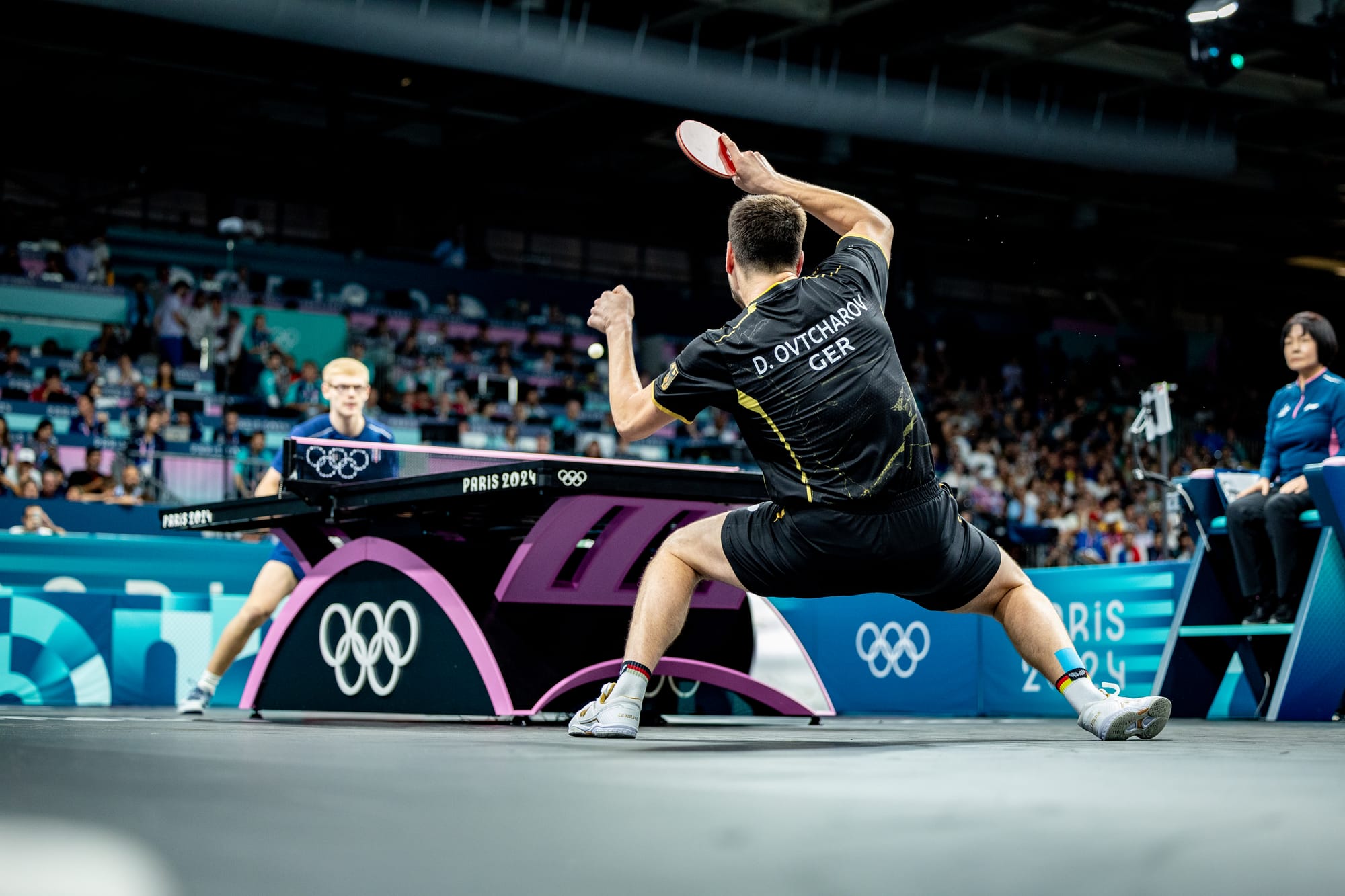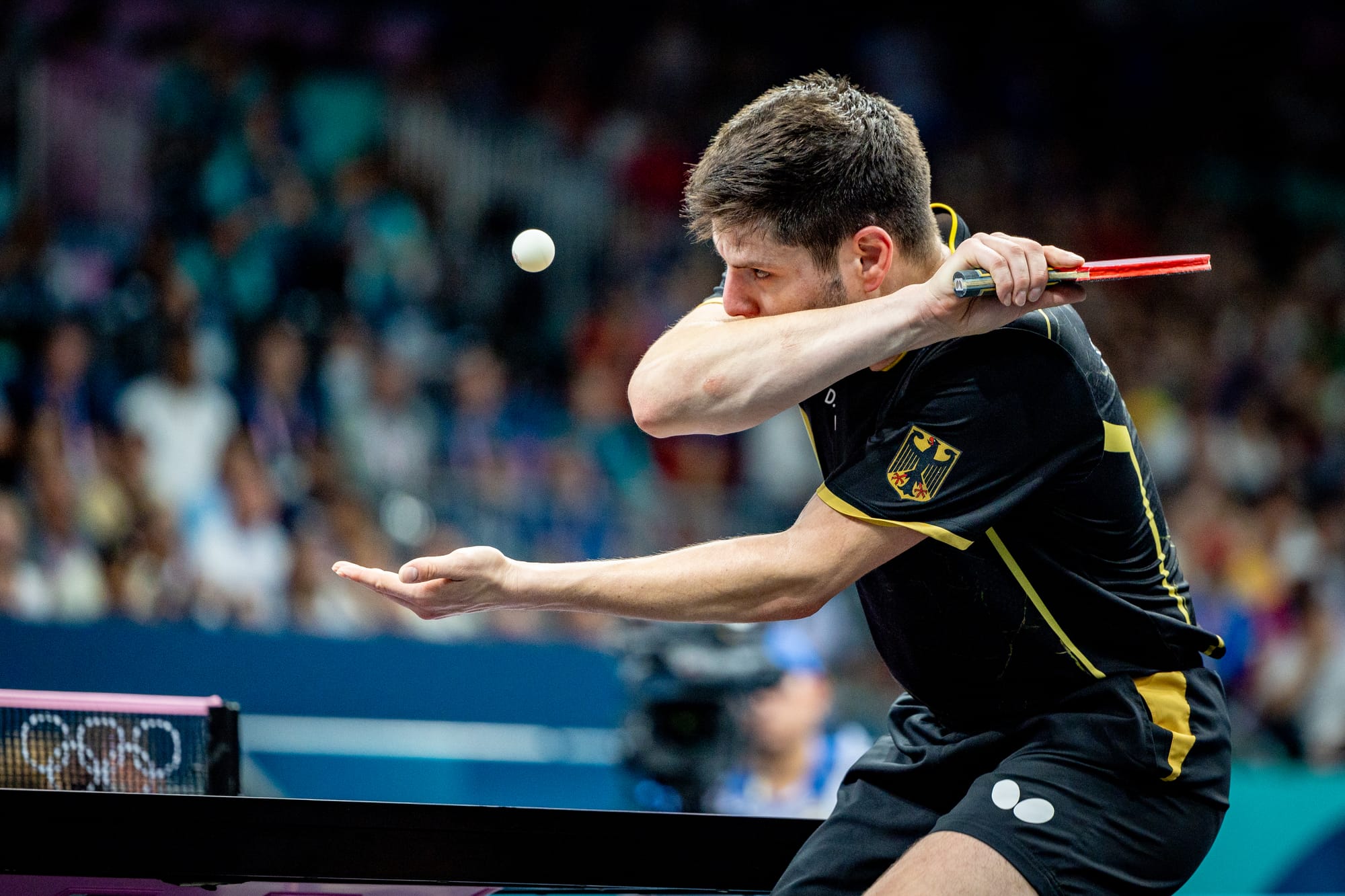Olympic Games: Spectacular farewell for Dimitrij Ovtcharov from the singles tournament

After bronze in London 2012 and Tokyo 2020, Dimitrij Ovtcharov was denied a third Olympic medal in the singles at the Summer Games in Paris. In the South Paris Arena 4, which was sold out with 6,400 spectators, the former world number one suffered a wafer-thin 3:4 defeat against France's 17-year-old superstar Felix Lebrun in a round of 16 match at the highest level.
At 116 decibels: Zinedine Zidane and Henri Leconte celebrate Felix Lebrun
The images shortly after the last rally could hardly have been more contrasting. While Dimitrij Ovtcharov, sitting on the bench with a blank look on his face, was deeply disappointed about the 9:11, 13:15, 10:12, 11:8, 11:3, 11:8 and 7:11 defeat, the French fans - including France's soccer star Zinedine Zidane and former tennis ace Henri Leconte - celebrated their hero Felix Lebrun in the South Paris Arena 4 with loud chants for his performance and his entry into the quarter-finals. The deafening background noise, even during the match, didn't cause Ovtcharov any problems: “The fact that the arena was behind him wasn't a problem. I was in the tunnel so much that I could only see my opponent and my game. It was loud, but it was nice. It didn't distract me at all.” The political magazine 'Le Point' reveals just how loud you can imagine the atmosphere to be on its website: “How can you describe the atmosphere at match ball? We had the fun of measuring the decibel level in the hall at the time: 116, a volume somewhere between a rock concert and a Formula 1 racetrack.”
Spectacular exchange of blows over seven sets
The victory of the currently best non-Chinese player and world number five over the former world number one could hardly have been more spectacular. Lebrun, who after his meteoric rise to the top ten in his home country is no further behind soccer star Kilian Mbappé in terms of media attention, and the 18-year-old Ovtcharov battled it out at the highest level for seven sets in an evenly-matched game with crazy speed. Although Felix Lebrun took control more often than his opponent at the beginning with flawless table tennis, Ovtcharov fought back in every set towards the end. However, the first three sets were won by the Frenchman with a difference of two points each. Ovtcharov said afterwards: “I lost the first three sets by two points. In the first set, I missed a few chances to take the lead by two or three points and then lost 9:11. I had two set points in the second set, where I played extremely confidently and hoped that I would somehow take the set.”

Ovtcharov: The game really starts after the second set
However, it was also noticeable that the German, who had already earned two set points in extra time after trailing 6:10 in the second set, adjusted better to his opponent's serve and even managed to parry the teenager's lightning-fast parallel backhand on several occasions. Ovtcharov's improved performance was also visible in the numbers. The 2017 World Cup winner threw down the gauntlet in the direction of the leading Lebrun with vehemence in the third set, which he lost again, and in the three subsequent rounds, which he won in succession with a 4:0, 6:0, 8:0 and 4:0 start. From Ovtcharov's point of view, the match only really began after the unfortunate loss of two set points in the second round: “After that, I really started to play what I had planned. I got better on my return of serve in particular. In the first two sets, I felt I lost 80 or 90 percent on his serve and didn't have a huge advantage on my own serve. I led 5:1 in the third and lost again. After that, the tension fell away from me. I returned much better, also from the short forehand with the forehand. Then my backhand returns were also much better and I read the long serves better. So I got more and more control over the game.”
“Those who lead 3:0 often have a problem closing out the game”
However, the German was unable to seamlessly continue the spectacular, physically and mentally exhausting comeback to 3:3, which had clearly made an impression on the Frenchman over three relatively clearly won sets, in the seventh set. At the same time, Lebrun seemed to have pressed the reset button. He quickly pulled 6:2 and 8:4 ahead before Ovtcharov shortened the gap to 7:8, but four points in a row from the Frenchman finally shook the South Paris Arena 4. Ovtcharov knew that the equalizer at 3:3 does not necessarily mean a psychological advantage: “It is often the case in table tennis that the player who leads 3:0 then has difficulties closing out the match. In the seventh set, however, everything is back to zero. I was expecting him to play well again. I can't play the first ball away. After that he played well and afterwards, at 8:7 for him, the first ball was decisive.” Jörg Roßkopf added: “Felix withstood the pressure. The way he played in the important phases was strong. In the last few months on the WTT Tour, Felix had already proven that he plays well in important phases.”

Dimitrij Ovtcharov: “I was actually a bit better in the end”
Ovtcharov, who had already proven his outstanding form in the previous rounds with his clear victories against Mexico's Marcos Madrid and Brazil's Vitor Ishiy, mourned some pre-decisive moments in the second and deciding set in the round of 16 duel: “I had two set points in the second set, where I played extremely confidently and hoped that I would somehow take the set. In the last set, I played a good return in the first rally and then made the backhand opening away. A ball like that hurts. It makes a difference whether you're leading 1:0 or trailing 0:1. On the other hand, he played some of his best balls, especially when I got back into it. At 8:7 for him, it was a crazy rally. If I can win that, anything is possible. I was actually a bit better in the end, but I really struggled at the start.”
Dimitrij Ovtcharov: “I'm very, very sad at the moment”
After the defeat, Ovtcharov gave an insight into his emotional world: “I will certainly take a break tomorrow. I'll think about maybe watching another sport to get my mind off things. I lost 3:4 against a very strong player. Of course I'm very, very sad at the moment, because I wanted to win another medal here. It didn't work out. That's why I'm very disappointed. I need to take my mind off things now, recover, get my mind off things and then get back into the team at 120 percent.”
Men's national coach Jörg Roßkopf remained analytical in the moment of defeat: “It was a great match with lots of chances for Dima. Felix won the first three sets so narrowly, Dima didn't play his best table tennis yet. He had many chances. The second set in particular would have been important. Unfortunately, Dima got off to a bad start in the seventh. Felix's lead of 5:1 was too high in the end. Dima made one or two mistakes that shouldn't have happened to him. Nevertheless, it was a world-class match at a really high level.”
Source: DTTB press release
Feature pictures: Dimitrij Ovtcharov (Photos: BeLa Sportfoto)